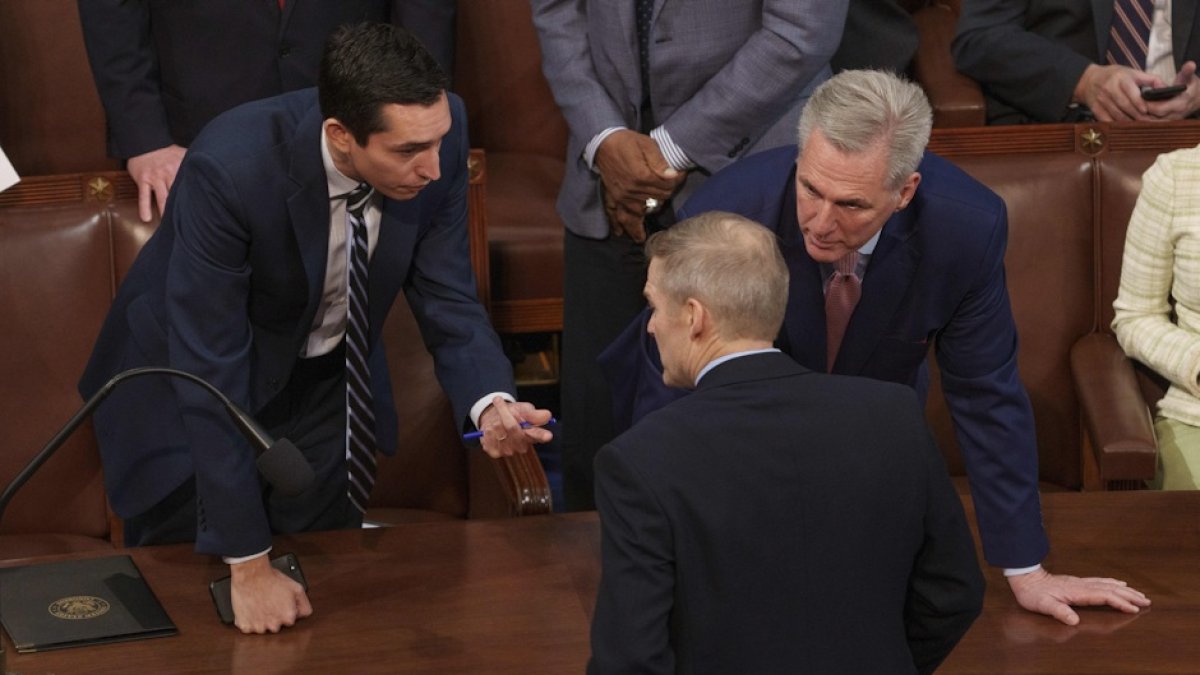A government shutdown divides the GOP in Congress: Some "are more populist than Republican”
Kevin McCarthy is failing to unite lawmakers to advance his proposal to the Senate, frustrating leadership.

Kevin McCarthy y Jim Jordan / Cordon Press.
The United States decides how to spend public money year after year, when Congress approves what is called the Appropriations Bill. The deadline that legislators have to make a decision on a bill is October 1st. If there is no approved bill by then, the federal government shuts down.
The logic comes from the National Constitution, specifically from Article 1, Section 9: "No Money shall be drawn from the Treasury, but in Consequence of Appropriations made by Law; and a regular Statement and Account of the Receipts and Expenditures of all public Money shall be published from time to time."
Once a shutdown occurs, certain agencies stop functioning. Employees cannot work and their pay is withheld until Capitol Hill agrees on a resolution. Until now, the longest closure in history was in 2019, when 35 days passed until everything was working normally again. It is estimated that 800,000 public employees did not receive their pay during that period of time.
One of the most remembered scenes of that shutdown occurred when Donald Trump, then president, had to welcome the Clemson University football team, who had recently been crowned in the National College Football Championship. Since the employees at the White House couldn't work, the president used his own money and bought food from McDonald's, Wendy's and Burger King.
Four years later, with just days until the government shuts down again, the Republican Party is going through internal conflicts.
A new round of McCarthy vs. House Conservatives
The Republican leadership in the House of Representatives, led by Kevin McCarthy, has already proposed a plan to avoid a government shutdown. However, not having sufficient support among their own ranks, they did not dare to put it to a vote.
The bill would extend the deal deadline to the end of October, cut discretionary spending by 8% and includes most of the Border Security Act of 2023.
Some conservatives in the House, enough to overturn the Republican majority in the Lower House, announced that they would vote against it. According to them, too much is being granted to the Democrats.
For example, they demand that the total spending commitments of the 12 appropriations bills not exceed $1.471 trillion before moving toward a CR.
This is what Matt Rosendale expressed (R-MT), for whom the proposal "is a continuation of Nancy Pelosi's budget and Joe Biden's policies." In the same vein, Matt Gaetz (R-FL) spoke and claimed that the government is on its way to shutting down because of Kevin McCarthy. He even dared to predict that he could face a motion to remove him as the speaker of the House.
Chip Roy (R-TX) criticized this group for the refusal and predicted that "they are going to eat a s*** sandwich" and that "they probably deserve to eat it."
The Senate trusts McCarthy to negotiate with the Democrats
The GOP leadership in the Senate is not very happy with the idea of a shutdown. Mitch McConnell (R-KY) is waiting for the House of Representatives to reach a deal so he can take it up in the Senate.
“We’re waiting to see what the House is going to do on a continuing resolution. I think all of you know I’m not a fan of government shutdowns, I’ve seen a few of them over the years, they never have produced a policy change and they’ve always been a loser for Republicans, politically,” he indicated to the press.
In turn, others believe that McCarthy should negotiate with Hakeem Jeffries (D-NY) to get some Democratic votes and not rely on the group of conservatives.
"Sooner or later he’s going to have to go to Jeffries because we’re going to get a CR on this side and what will pass here just is not going to get 218 Republicans in the House," let slip a senator in dialogue with The Hill, on condition of anonymity to be able to speak more freely.
Mike Rounds (R-SD) openly criticized House conservatives for their position on the Republican plan.
“I think we’ve got some folks that wear our label as Republicans that are really more populist than Republican, and at this stage of the game we’ve been relying on those folks to come around and work on some of these more conservative issues with us, like actually passing a budget, actually passing an appropriations bill, actually passing a defense bill. Clearly this is not of interest to them,” he said.
A bipartisan solution?
The Problem Solvers Caucus, a bipartisan group of 64 House lawmakers, on Thursday presented an alternative solution to avoid the shutdown.
"It's about governing with common sense over extremism, and that's how Washington should work," said Democrat Josh Gottheimer, co-chair of the legislative group.
The proposal would extend government funding at current levels through Jan. 11, 2024, giving Congress more than three months (two more than in the Republican proposal) to agree on regular allocations.
It also includes an agreement to approve appropriations bills for the entire fiscal year 2024, with the spending limits agreed upon in the Fiscal Responsibility Act, which was agreed upon between Biden and McCarthy.
Additionally, unlike the Republican plan, it would add Biden's request for supplemental funding to Ukraine, for an additional $24.1 billion.
Finally, it would create a fiscal commission to recommend changes related to the public debt and national deficits, while also requiring the Congressional Budget Office to consider the cost of debt service in its estimates.
Kevin McCarthy's plan to avoid a government shutdown
The proposal begins by extending the deadline to submit legislation that would fund the federal government during fiscal year 2024. The new date would be the end of October, which would give Congress an extra month to negotiate an agreement, although it does not ensure that a shutdown will not take place on the first day of November. Everything would be contingent on an agreement between Democrats and Republicans.
In addition, it would cut discretionary spending by 8%, understood as funding for federal agencies, although it would protect funds for Defense, emergency relief and the Department of Veterans Affairs.
Finally, the Republican bill includes most of the Border Security Act of 2023, one of the significant pieces of legislation by House Republicans. However, the new plan excluded provisions requiring E-Verify. The legislation is still waiting for the Senate to take it up.
The plan presented was achieved after an agreement between the House Freedom Caucus and the Main Street Caucus, defined by their colleagues as the group of "pragmatic conservatives."

























